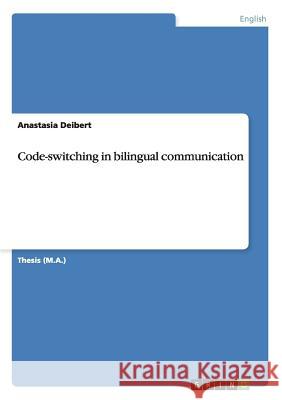Code-switching in bilingual communication » książka
Code-switching in bilingual communication
ISBN-13: 9783656569701 / Angielski / Miękka / 2014 / 136 str.
Thesis (M.A.) from the year 2010 in the subject English Language and Literature Studies - Linguistics, grade: 1, University of Stuttgart (Institut fur Linguistik), course: English Language and Literature Studies - Linguistics, language: English, abstract: This thesis is about the use of two languages in everyday life. Bilingualism is a facet of nearly every country in the world and code-switching is a widespread characteristic of bilingual speech. Today, bilingualism and code-switching research constitute a great area in linguistics. An obvious and at the same time interesting aspect is that bilinguals will, of course, stay within one language when talking to monolinguals. However, when talking to other bilinguals, they will probably use both languages. Thus, in bilingual conversations, they often switch from one language to another and frequently even within an utterance. The following example shows how a code-switched sentence looks like. (1)Es ist schon interessant как мы так говорим. Я даже не замечаю, dass wir so reden. It's really interesting how we're talking like that. I don't even notice that we're talking like that. Such kinds of switches call for a special competence of the two languages involved. But how well the bilinguals have to know each of the languages is a justifiable question. These switches are not arbitrary since they may depend on the situation of the conversation, the topic of the conversation, the emotional aspects involved, the language preference of the speaker and the need to express the own identity. Bilingualism and especially code-switching were long considered as "a sign of linguistic decay" (Appel & Muysken 1987: 117). It was claimed that bilinguals are not able to acquire two languages properly and language mixing was often considered ungrammatical. However, both negative and positive views on the consequences of bilingualism have been studied and many studies showed positive evidence on bilingualism and code-switching. In rece











